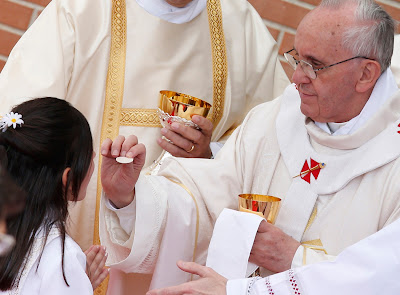Eucharist, OUR ALL.
June 19, 2022.
The Solemnity of the Most Holy Body and Blood of Christ – C.
“For as often as you eat this bread and drink the cup, you
proclaim the death of the Lord until he comes.” 1 Cor 11:26
A Sicilian proverb says: “Bread and wine strengthen the
back.” And a Corsican proverb adds: “He who eats holy bread has to deserve it.”
The Catechism of the Catholic Church (1324-1327), states
that the Eucharist is "the source and summit" of the Christian life.
The other sacraments, and indeed all ecclesiastical ministries and works of the
apostolate, are bound up with the Eucharist and are oriented toward it. For in
the blessed Eucharist is contained the whole spiritual good of the Church,
namely Christ himself, our Pasch.
When we come to the Eucharistic banquet, we come to receive
the one who for our salvation handed over his life on the Altar of the Cross.
In the Eucharist, we revive Christ's sacrifice, the supreme and ultimate
sacrifice that pleases God and that won for us remission of sins and
justification. Therefore, we live by the Holy Eucharist. It is our all. It is
Christ by our side and in us, our hope of glory.
While celebrating the solemnity of Corpus Christi, the
liturgy today gives all the meaning of the Holy Eucharist. In the first
reading; through the offering of Melchizedek and his blessing to Abram, the
Eucharist is foreshown as a Thanksgiving and blessing. And the role of the
priest is emphasized as the one who offers the sacrifice.
In the second reading, through the narrative of St. Paul to
the Corinthians, the Eucharist is presented in what it truly is, the supreme
and ultimate sacrifice of Christ. And follows the mandate to make it perpetual.
In this address of Paul to the Corinthians, we have all the words of the
consecration that the priest uses in the Eucharistic celebration. We are told
that the mass is not mimesis or mere repetition of something that was done
once, but an actualization and a continuation of Christ's sacrifice for our
life. At every Eucharistic celebration, in the person of the priest, though
sinner, it is Jesus Christ himself who comes to offer anew his true body and
blood. The priest as minister acts in Persona Christi.
And lastly, the Gospel presents the Holy Eucharist as the
bread of the journey. It is the bread that sustains us so that we may not faint
on our way to God’s Kingdom. We are pilgrims in the deserts of this world. Jesus
offers himself to feed us and give us strength. Through the multiplication of
bread and the feeding of the people in the desert, we have many great
implications and lessons on the way we must see and approach the Holy
Eucharist. The Eucharist is a place where the Lord sees our needs, shows us his
compassion, and asks us to contribute to feeding the needs of others.
We read from the Gospel that, after spending the whole day
teaching the people bout the Kingdom of God and healing those with infirmities,
some of the disciples approached the Lord and asked him to send the people away
because of being in a deserted place, where there was no food for them. The
answer of the Lord to them was: “Give them some food yourselves.” The Eucharist
is the place where the Lord invites us to raise our sense of concern for the
need of our brothers and sisters. No matter how little could be what we have:
“Five loaves and two fish.” We have to be eager to share it. For, in the
Eucharistic banquet, what is shared is always enough for all. The Lord shed his
Body and Blood for us all, sinners so that we too could share our love for the
need of others.
May we end our meditation with this exhortation of St. Augustine quoted by Br. Julian McDonald cfc. It is a calling for us to become what we eat. He said: “Behold who you are, become what you receive!” As to say, “Look, you are the body of Christ! Do you really appreciate who you are?” Therefore, “…become what you receive! Become a Eucharistic bread! Become nourishment for everyone with whom you interact when you walk out of the church today! Be the new bread, broken and given to nourish the lives of those you will encounter today and into the future. Give selflessly of yourself and of your time and energy. Breathe life and hope into others, into your family members, your friends, your work colleagues, and the strangers you meet.” Never forget that “You are the Body of Christ” and that the Eucharist is your all and all that you are must be Eucharist.





Comments
Post a Comment